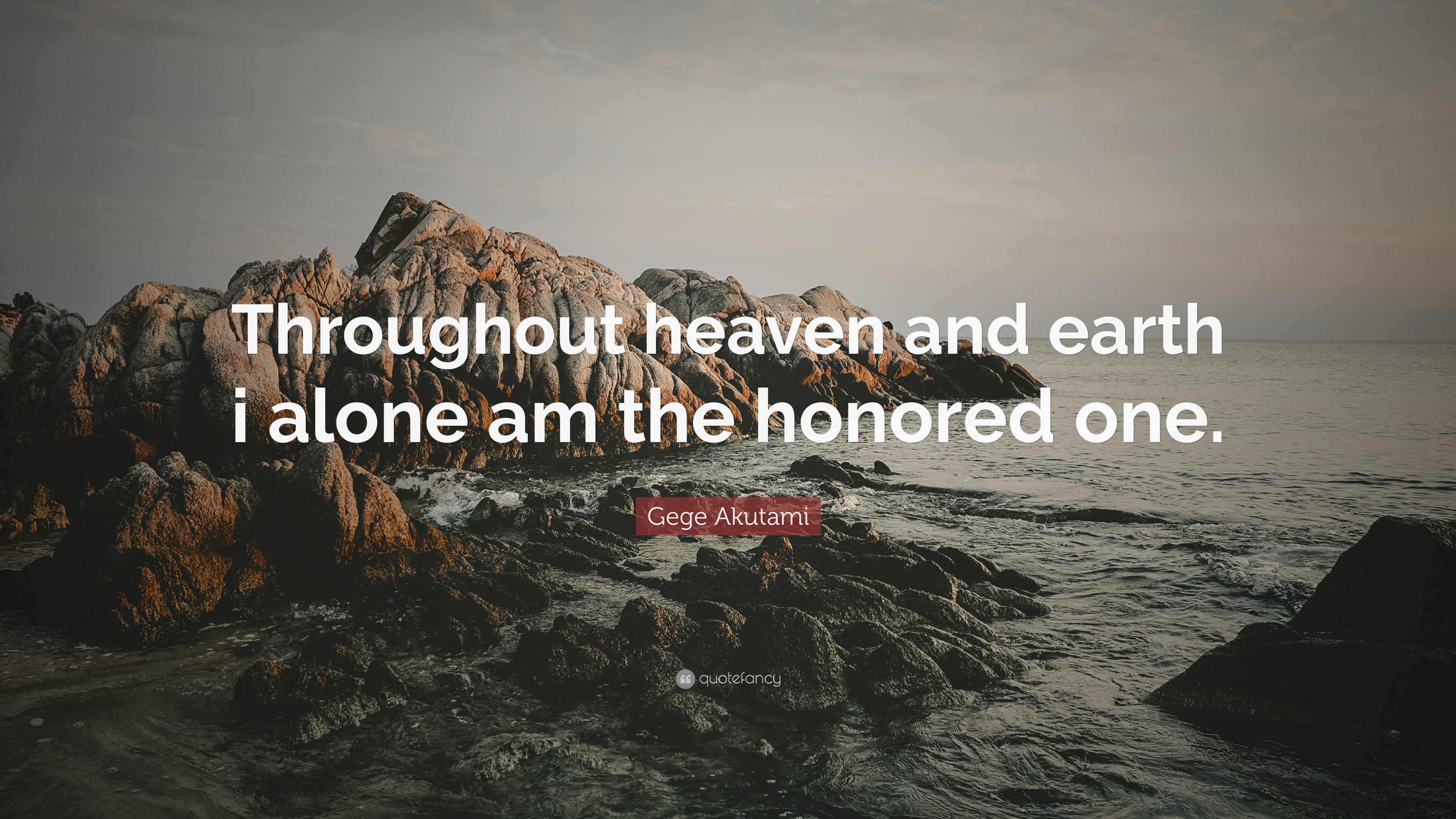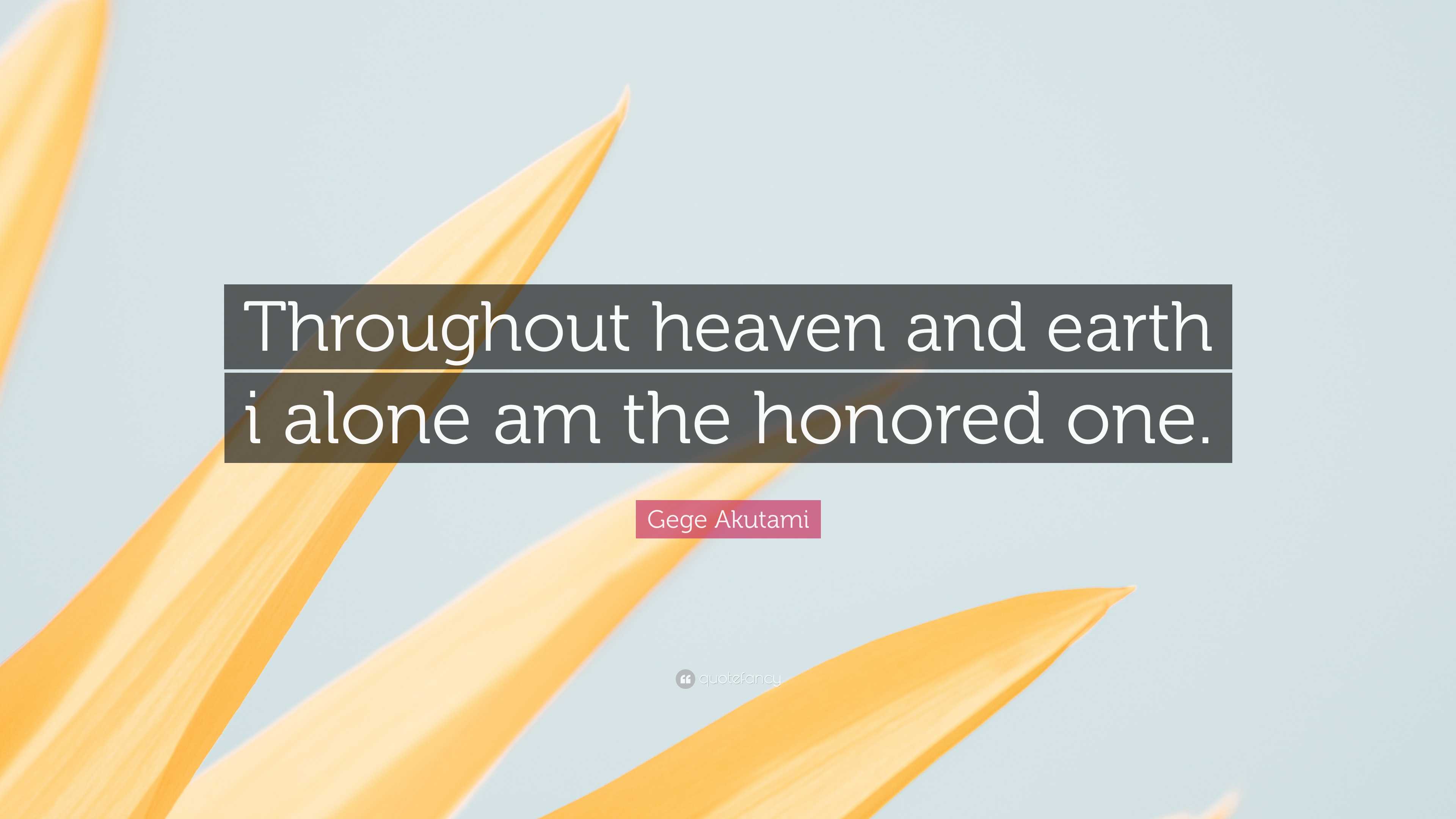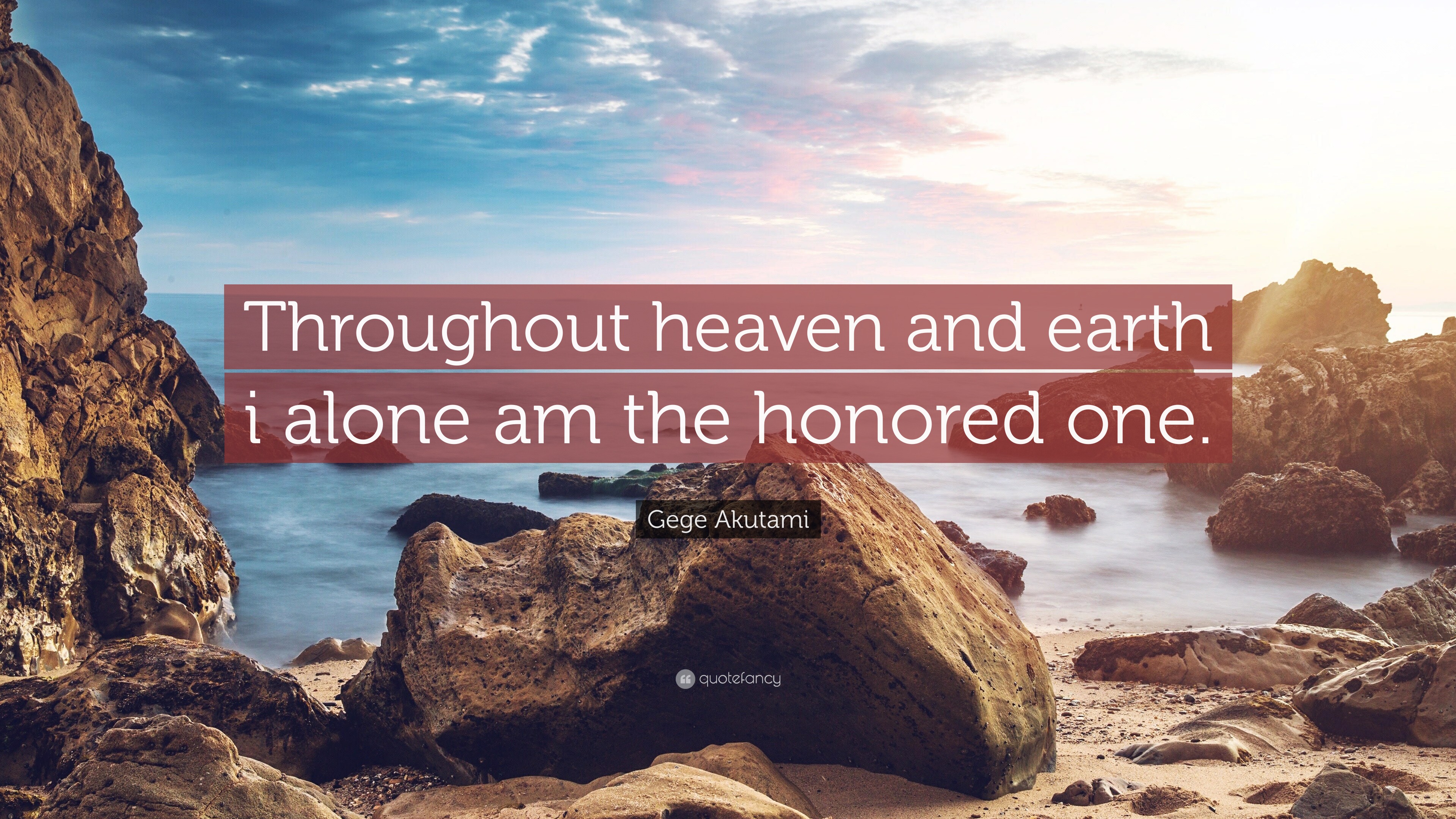Have you ever heard a phrase so powerful, so resonant, that it just sticks with you? Something that feels ancient yet incredibly current? Well, that's often the experience people have with the declaration, "Throughout Heaven and Earth I Alone Am the Honored One." It's a statement that truly captures attention, sparking thoughts about deep wisdom and even incredible strength.
This particular saying, you see, has quite a remarkable journey. It travels from the profound beginnings of a spiritual leader to the dynamic, action-packed scenes of a very popular modern story. It appears in contexts that are very different, yet it seems to carry a similar weight, a sense of ultimate importance. People often wonder about its true meaning, too, and why it holds such significance.
Today, we're going to explore the layers of this fascinating declaration. We'll look at where it comes from, what it might truly mean, and why it continues to echo so strongly in our collective imagination, appearing in places you might least expect. So, let's just consider this phrase and its lasting impact.
Table of Contents
- The Echo of Ages: Tracing the Origin of "I Alone Am the Honored One"
- More Than Words: Deeper Meanings and Interpretations
- Why This Phrase Resonates Across Time
- Frequently Asked Questions
The Echo of Ages: Tracing the Origin of "I Alone Am the Honored One"
The saying, "Throughout Heaven and Earth I Alone Am the Honored One," carries a very significant history. It's a phrase that has, in a way, lived many lives, finding its way into different traditions and stories. Its initial appearance is deeply rooted in ancient spiritual narratives, which is quite interesting to consider.
The Buddha's Profound Proclamation
The earliest and perhaps most well-known attribution of this statement is to the Buddha Sakyamuni. As the story goes, right after his birth, the crown prince, who would later become the Buddha, took seven steps in each of the four main directions. After these steps, he pointed with one hand toward the sky and the other toward the earth, and then he made this incredible declaration. This is a very powerful image, a sort of foundational moment.
Now, the exact wording of this statement can vary a little depending on the tradition. Some versions say, "Above heaven, under heaven, I alone am the holy one," or "Heaven above heaven below, I alone am the world honored one." These different ways of putting it still carry the same core message, a sense of supreme importance. It's often cited from a Pali text, and also appears in the Lotus Sūtra, which is a very influential Buddhist Mahāyāna Sūtra. So, it's got quite a solid historical and textual grounding, you know.
The meaning behind the Buddha's statement is something people discuss a lot. It isn't meant as a boast, a sort of arrogant claim of superiority over others. Instead, it's often understood as a profound realization, a declaration of his unique position after attaining supreme enlightenment. It means, in a way, that he is the highest in this world, that he is foremost, or the best in this world, because he has found the ultimate truth. It also signifies that this is his last birth, meaning there will be no further becoming for him, which is a truly significant spiritual achievement.
When the Buddha achieved this state, it is said he used his holy sight to search all realms for anyone nobler to pay homage to, and found none. This search, in a way, solidified his understanding that he had reached the pinnacle of spiritual insight. So, the phrase is less about personal ego and more about the universal truth he had realized, a truth that makes one worthy of honor throughout all existence.
Gojo Satoru's Powerful Utterance in Jujutsu Kaisen
Fast forward many centuries, and this ancient, profound statement finds a new life in popular culture. Gojo Satoru, who is often considered the most powerful sorcerer in the story of Jujutsu Kaisen, utters a version of this very phrase. He says, "Throughout heaven and earth, I alone am the honored one," during a very intense fight with Toji Fushiguro. This moment is quite memorable for fans, as it shows a huge turning point for Gojo.
In the context of Jujutsu Kaisen, Gojo's declaration comes after he experiences a sort of awakening or a new level of power. It's a moment where he truly understands his own strength and capabilities, realizing he has become, essentially, the strongest. His statement, in this setting, isn't merely an arrogant claim. Instead, it reflects his absolute confidence and the immense power he has just unlocked, much like the Buddha's proclamation marked his ultimate spiritual attainment. It's a very similar kind of moment, in a way, of becoming something truly exceptional.
Fans of the series have spent a lot of time talking about this scene. Some see it as a moment of pure, unadulterated coolness, a display of Gojo's incredible abilities. Others, however, connect it directly to its Buddhist origins, seeing Gojo's declaration as a modern echo of the Buddha's enlightenment, but in a context of immense magical power. It certainly gives even his greatest fans pause, making them consider the depth of his character and the source of his strength.
More Than Words: Deeper Meanings and Interpretations
The phrase "Throughout Heaven and Earth I Alone Am the Honored One" holds layers of meaning that go beyond just its literal words. It's a statement that invites a lot of thought and discussion, especially when you consider its different contexts. It's quite interesting how one set of words can carry such varied, yet related, interpretations.
A Statement of Ultimate Enlightenment
In its original Buddhist context, the declaration is a symbol of supreme enlightenment. It's not about one person being better than another in a worldly sense. Rather, it speaks to the realization of a universal truth, a deep understanding of existence that transcends ordinary human experience. It means recognizing one's inherent Buddha-nature, the potential for awakening that exists within every living thing. So, in this view, the Buddha wasn't saying "I am better than you," but rather "I have realized the ultimate truth, and this truth is the most honored thing in all existence."
This understanding suggests that the statement is about the end of suffering, the cessation of rebirth, and the attainment of a state of perfect peace and wisdom. It's a declaration that the cycle of existence, with all its troubles, has been fully understood and overcome. This is, in a way, the highest possible achievement a being can reach, making the one who achieves it truly worthy of honor across all realms. It’s a very profound idea, actually.
Arrogance or Humility? The Great Debate
The interpretation of this phrase often sparks a lively discussion: is it a statement of arrogance or one of profound humility? Some people, when they hear it, might instantly think it sounds quite boastful, a claim of personal superiority. If you take the words very literally, without any context, it could certainly come across that way. It sounds like someone saying they are the best, and no one else comes close, which can feel a bit much, you know.
However, many others, particularly those familiar with Buddhist teachings, see it as a statement of deep humility. They argue that the Buddha, having achieved enlightenment, was simply stating a factual truth about his spiritual state. It's not about pride, but about the objective reality of having reached a level of understanding that is, in fact, unparalleled. This perspective suggests that the declaration is a recognition of the universal truth, a truth that is available to all, and the Buddha was simply the first to fully realize it in his time. So, it's almost like a humble acknowledgment of a profound spiritual reality.
The nuance here is important. If you consider it a declaration of the highest truth, a truth that liberates all beings, then the one who realizes and shares this truth is, by definition, worthy of honor. It's not a claim of personal ego, but a recognition of the unique role in bringing such a powerful realization to the world. This is a very different way of looking at it, and it tends to shift the perception from arrogance to a kind of profound, humble acknowledgment of one's spiritual position.
Understanding "Throughout Heaven and Earth"
The phrase "throughout heaven and earth" is also very significant. It gives the statement a universal scope, indicating that this honored status applies to all realms, all dimensions of existence. It's not just about a small corner of the world or a single time period. It means everywhere, across all of creation, which is a rather expansive idea.
There's a subtle but important difference between "throughout" and words like "during" or "through." "During" implies a specific period of time, like "during the wedding service." "Through" often suggests movement from one end to another, like "walking through the park." But "throughout" means "in every part of" or "everywhere in." So, when the phrase says "throughout heaven and earth," it truly means in every single part of the heavens and the earth, in all directions, at all times. It suggests an omnipresent, all-encompassing status, which is quite powerful, you know. This is the actual meaning of the phrase, as per the legend, Buddha, right.
Why This Phrase Resonates Across Time
This particular declaration, "Throughout Heaven and Earth I Alone Am the Honored One," continues to capture people's imaginations for several reasons. It has a kind of timeless appeal, a way of speaking to very fundamental human experiences. It's not just an old saying; it feels very relevant even today.
One reason is its connection to the idea of ultimate potential. Whether it's the Buddha reaching supreme enlightenment or Gojo Satoru becoming the strongest sorcerer, the phrase speaks to a moment of complete self-realization, of reaching the absolute peak of one's abilities or spiritual understanding. People are often drawn to stories of mastery and profound achievement, and this phrase embodies that perfectly. It's a statement of ultimate arrival, so to speak.
Another aspect is its adaptability. The phrase has successfully transitioned from ancient spiritual texts to modern popular culture, showing how universal its underlying themes are. It can represent spiritual liberation for some, and incredible power for others. This flexibility allows it to resonate with a wide variety of people, each finding their own meaning within its powerful words. It's quite remarkable, actually, how it fits into different settings.
The very idea of being "honored one" also holds a deep appeal. It taps into a desire for recognition, for having one's true worth acknowledged. In the spiritual sense, it's about the inherent dignity and preciousness of awakened consciousness. In the fictional sense, it's about the awe inspired by unparalleled strength. This makes the phrase incredibly compelling, a sort of declaration of profound significance that truly stands out.
It's also, in a way, a very simple yet profound statement. It cuts straight to the core of what it means to be truly exceptional, whether that exception comes from spiritual insight or immense personal power. This clarity, combined with its grand scope, makes it a phrase that people remember and often ponder for a long time. It certainly has a lasting impact, doesn't it?
Frequently Asked Questions
Did Buddha really say "Throughout Heaven and Earth I Alone Am the Honored One"?
Yes, according to Buddhist tradition and texts like the Lotus Sūtra and Pali texts, the Buddha is said to have uttered a version of this statement shortly after his birth. It's a significant part of his life story, symbolizing his unique spiritual status. So, it's a very old and respected part of the teachings.
What does Gojo Satoru mean by "Throughout Heaven and Earth I Alone Am the Honored One"?
In Jujutsu Kaisen, Gojo Satoru's use of the phrase signifies his moment of profound realization and becoming the strongest sorcerer. It represents his ultimate power and confidence after a major turning point in his abilities, much like the Buddha's declaration marked his supreme enlightenment. It's a statement of his absolute, unparalleled strength in his world.
Is the phrase "I Alone Am the Honored One" arrogant?
The interpretation varies. On one hand, if taken literally without context, it can sound arrogant. On the other hand, in Buddhist thought, it's understood as a factual declaration of the Buddha's unique spiritual attainment and realization of universal truth, not a boast. It signifies his role as the one who has fully awakened and can guide others, which is a rather humble act, in a way. The meaning really depends on the perspective you take.
Learn more about spiritual wisdom on our site, and link to this page here for additional insights.
- Cristina Carmella Onlyfans
- Amber Lovato
- %D8%AF%D8%A7%D9%86%D9%8A%D9%8A%D9%84%D8%A7 %D8%B1%D8%AD%D9%85%D8%A9
- Joyce Gibson
- Halo Nightclub Atlanta



Author Details:
- Name : Oral Gleichner
- Username : justen79
- Email : lucas42@crona.org
- Birthdate : 1992-10-25
- Address : 29438 Millie Overpass Apt. 816 South Ferne, AZ 60685
- Phone : +19017074201
- Company : Bernhard, Howe and Ullrich
- Job : Anesthesiologist
- Bio : Incidunt provident provident necessitatibus amet error corrupti illo. Numquam quos recusandae maiores ullam. Officia nihil sint qui ipsa animi hic maiores.
Social Networks
Tiktok:
- Url : https://tiktok.com/@nrath
- Username : nrath
- Bio : Adipisci corporis ipsa reiciendis rerum quae ex dolores.
- Followers : 6337
- Following : 70
Facebook:
- Url : https://facebook.com/nona4699
- Username : nona4699
- Bio : Eum assumenda quaerat ut aut dolorem. Aut aut non cum amet est.
- Followers : 2268
- Following : 714
Instagram:
- Url : https://instagram.com/nrath
- Username : nrath
- Bio : Velit sed error dolorem voluptas repellat et fugit. Nesciunt sit nesciunt cumque accusamus.
- Followers : 2512
- Following : 1373
Linkedin:
- Url : https://linkedin.com/in/nona_id
- Username : nona_id
- Bio : Quae et dolores quasi ab mollitia.
- Followers : 3735
- Following : 1423
